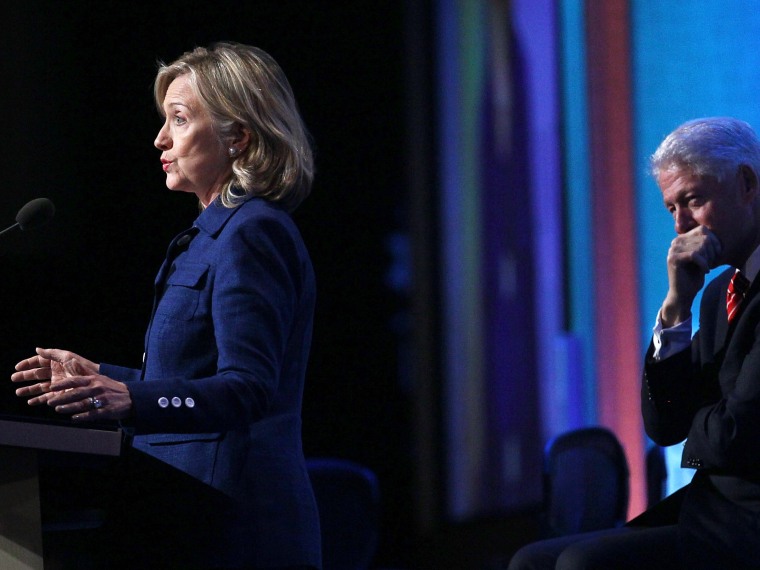Let me finish tonight with the war of words between Bill Clinton and Dick Cheney over Iraq.
We showed the video in tonight's show of the former president telling an audience in Denver this week that if they--meaning Cheney and Bush--hadn't gone to war in Iraq, none of this sectarian violence and chaos would be playing out in Iraq right now.
What stuck out to me was what happened when Bill Clinton said that: the crowd erupted in cheers.
Now, I know this was a Clinton audience. It was at a Clinton Global Initiative event--these are Clinton fans. But you could also read it as the Democratic base. And for anyone who remembers the 2008 primaries, this made it a noteworthy moment: a Democratic audience cheering a Clinton on Iraq.
Because, of course, Iraq was the one issue that more than any other that stopped Hillary in 2008, that gave purpose to Barack Obama's campaign, that ruined what everyone had started out assuming would be an easy Clinton restoration.
Hillary, and Bill for that matter, could criticize Cheney and Bush all they wanted over the conduct of the war in 2008. But this question always kept coming back: OK, well then how come you voted for it?
And Hillary had no good answer for that. She couldn't bring herself to say it was a mistake.
The thing is, all these years later, she still hasn't really answered the question. In her new book, she does use the word "mistake" to describe her 2002 vote for the Iraq War resolution. But she insists she didn't think she was actually voting for war, that all she was doing was giving George W. Bush a diplomatic tool. It's been 12 years, I know, but I remember that 2002 vote well, and no one thought it was anything other than a major step in the march to war in Iraq.
Both Clintons have had a difficult relationship with the subject of Iraq and war for a long time now. Back in 1991, when the first President Bush was about to launch the first Gulf War, Bill Clinton was gearing up to run for president. Bush went to Congress for authorization. The debate was intense. The vote was close. Most Democrats were against it. And back in Arkansas, Clinton tried to avoid taking a position until finally, on the eve of the war, after Congress had authorized it, he was put on the spot.
"I guess I would have voted with the majority if it was a close vote," he said. "But I agree with the arguments the minority made."
Of course, the first Gulf War ended up being the "good" Gulf War: we kicked Saddam out of Kuwait, we didn't take many casualties, we stayed out of Baghdad and we came home fast. There were parades after that war, Bush's approval rating soared, and only then did Clinton begin boasting that he'd been for the war. It became one of his selling points when he beat Bush in 1992.
The memory of how easy that '91 Gulf War was--or how easy it seemed--probably shaped the decisions of a lot of members of Congress when that 2002 vote came up. Maybe Hillary was one of them. It's tough to say. It still feels like we haven't gotten a full accounting of why exactly she cast the vote and what she's learned from the war.
And maybe we'll never get one. Six years have passed since 2008. Memories fade, questions get forgotten, grudges tend to fizzle out. Bill Clinton got those heads nodding and got that crowd cheering this week by pinning the war only on Bush and Cheney. All these years later, it may be that Democrats are done blaming anyone else.
